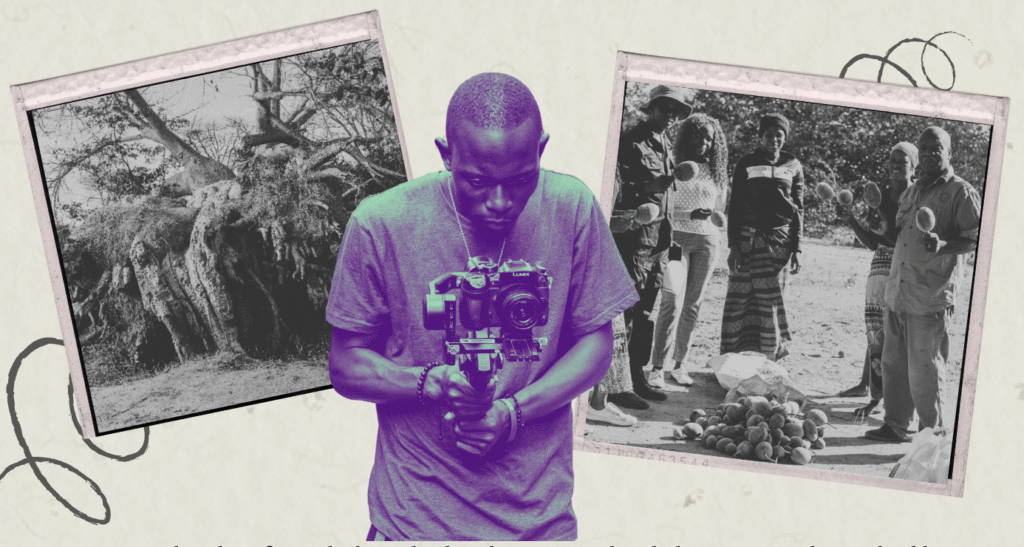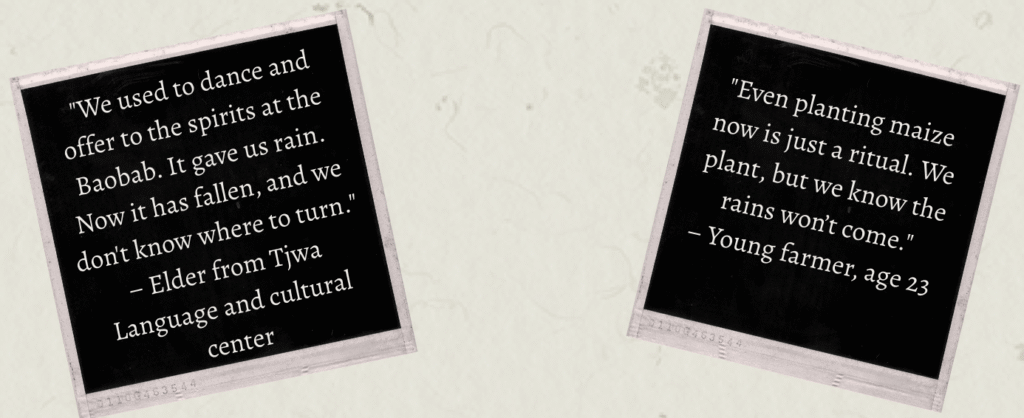
By Shaun Karongosora
I’m sitting on the edge of a cracked wooden bench, camera in hand, the sun rising slow and golden over the bushlands of Tsholotsho. It’s my first field trip, first time this far from the city, first time working on something that feels bigger than me. We’ve come here to document the quiet power of the Tjwa community in Matebeleland North, where stories aren’t told in soundbites or headlines but through land, memory, and conversation.
This isn’t just a shoot. It’s a living, breathing piece of grassroots research for Magamba’s Climate X Indigenous Voices project. My role? To witness. To frame the moments where Indigenous knowledge holders share not only what they know, but how they’ve survived, adapted, and resisted through climate shifts. From group dialogues held under mopane trees to intricate mapping exercises, every scene is layered with meaning. Every click of my camera feeds into a much bigger picture. I’m here to learn how to see differently, and to make sure that what I see helps others do the same.
What I saw was tough; drought has hit hard. The fields are dry, crops have failed, and people are walking long distances just to find water.
But even in these harsh conditions, I met farmers who kept going, kids pitching in where they could, and elders who spoke of how things used to be before the climate shifted so drastically. One of the most powerful stories I heard was about a Baobab tree that had stood at the heart of the community for generations—a sacred place for rituals, dances, and spiritual gatherings. When it fell, many elders saw it as more than just a tree lost to time or weather. They linked it to the slow fading of cultural practices, a sign of both environmental and spiritual loss. That moment made the impact of the climate crisis feel deeply personal and impossible to ignore.

“We used to dance and offer to the spirits at the Baobab. It gave us rain. Now it has fallen, and we don’t know where to turn.” – Elder from Tjwa Language and Cultural Center
“Even planting maize now is just a ritual. We plant, but we know the rains won’t come.” – Young farmer, age 23
This journey really showed me just how powerful storytelling can be, especially when it puts Indigenous voices at the center. Spending time with the Tjwa community, I started to understand the climate crisis isn’t just about rising temperatures or failed crops. It’s also about the loss of traditions, the fading of languages, and the breaking of deep connections between people and the land. The elders spoke with so much wisdom, and every story felt like a piece of history that needs to be protected. I captured what I could—moments, faces, and words that speak volumes. These photos and stories will come together in a visual series that I hope can help raise awareness, push for real support, and show why Indigenous communities need to be part of the climate conversation. I can’t wait to share the final collection and keep learning how to use my camera to tell stories that matter.
Magamba’s Climate X Indigenous Voices project is part of a wider collaboration called “Amplifying Indigenous Activists Voices: Countering Climate Disinformation,” carried out by International Work Group for Indigenous Affairs (IWGIA), International Media Support (IMS), the Asia Indigenous Peoples Pact (AIPP), and Magamba Network. The project focuses on supporting Indigenous forest and climate activists with the tools and skills they need to navigate digital spaces, challenge false climate narratives, and work more effectively with media, content hubs, and fact-checkers to amplify their message.
